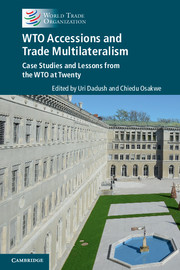Book contents
- Frontmatter
- Dedication
- Contents
- List of contributors
- Foreword
- Acknowledgements
- List of abbreviations
- Editors' note
- PART I WTO accessions, the trading system and the global economy
- PART II Overview: systemic outcomes from accessions
- PART III Members’ perspectives on accession negotiations
- PART IV Working party chairpersons’ perspectives on accession negotiations
- PART V Salient features inWTOAccession Protocols
- 29 Market access goods negotiations: salience, results and meaning
- 30 Services market opening: salience, results and meaning
- 31 WTO accession and the private sector: the nexus of rules and market opportunities
- 32 WTO accession and accession to the Agreement on Government Procurement: what is the relationship? Why should WTO acceding governments also consider GPA accession?
- 33 Energy-related rules in Accession Protocols: where are they?
- 34 Domestic framework for making and enforcing policies
- 35 Export duty commitments: the treaty dialogue and the pattern of commitments
- 36 Disciplining state trading practices: lessons from WTO accession negotiations
- 37 Intellectual property rights protection: the plus/minus debate from a least-developed country perspective – sense and nonsense
- 38 The future of multilateral investment rules in the WTO: contributions from WTO accession outcomes
- 39 Sanitary and phytosanitary measures: trends in accession plurilateral negotiations
- 40 Strengthening transparency in the multilateral trading system: the contribution of the WTO accession process
- PART VI Conclusion
- Annex: Contributor biographies
- Index
- Plate section
40 - Strengthening transparency in the multilateral trading system: the contribution of the WTO accession process
from PART V - Salient features inWTOAccession Protocols
Published online by Cambridge University Press: 05 November 2015
- Frontmatter
- Dedication
- Contents
- List of contributors
- Foreword
- Acknowledgements
- List of abbreviations
- Editors' note
- PART I WTO accessions, the trading system and the global economy
- PART II Overview: systemic outcomes from accessions
- PART III Members’ perspectives on accession negotiations
- PART IV Working party chairpersons’ perspectives on accession negotiations
- PART V Salient features inWTOAccession Protocols
- 29 Market access goods negotiations: salience, results and meaning
- 30 Services market opening: salience, results and meaning
- 31 WTO accession and the private sector: the nexus of rules and market opportunities
- 32 WTO accession and accession to the Agreement on Government Procurement: what is the relationship? Why should WTO acceding governments also consider GPA accession?
- 33 Energy-related rules in Accession Protocols: where are they?
- 34 Domestic framework for making and enforcing policies
- 35 Export duty commitments: the treaty dialogue and the pattern of commitments
- 36 Disciplining state trading practices: lessons from WTO accession negotiations
- 37 Intellectual property rights protection: the plus/minus debate from a least-developed country perspective – sense and nonsense
- 38 The future of multilateral investment rules in the WTO: contributions from WTO accession outcomes
- 39 Sanitary and phytosanitary measures: trends in accession plurilateral negotiations
- 40 Strengthening transparency in the multilateral trading system: the contribution of the WTO accession process
- PART VI Conclusion
- Annex: Contributor biographies
- Index
- Plate section
Summary
ABSTRACT
What specific obligations on transparency and notifications have been negotiated as part of the terms of accession to the WTO since 1995? What patterns and trends have emerged with regard to transparency and notification requirements in WTO accessions over time? What is the implementation behaviour on notification requirements of the states or separate customs territories that have negotiated their terms of accession, pursuant to Article XII of the Marrakesh Agreement Establishing the World Trade Organization and joined the WTO in the period 1995 to 2013? How does the compliance of Article XII members on notification requirements under the WTO Agreements compare to the compliance behaviour of original members? By reviewing the empirical data available from more than thirty completed WTO accessions since 1995, representing about one-fifth of the WTO membership, this chapter examines each of these questions, assessing the extent to which the negotiated accession commitments on transparency have affected the existing transparency and notification obligations under the WTO Agreements. The results of this review suggest that the specific transparency and notification obligations resulting from accession negotiations have safeguarded and reinforced existing transparency requirements embedded across all WTO Agreements. They have also resulted in positive implementation behaviour, with regard to notification requirements, by WTO members that joined the WTO between 1995 and 2013, and have thus improved the compliance rate of the overall WTO membership. The number and scope of specific transparency commitments negotiated in WTO accessions underscores the importance that the WTO membership attaches to transparency, one of its founding principles.
Transparency is a founding principle and central pillar of the multilateral trading system. Transparency obligations are embedded throughout all WTO agreements. Their main role is to ensure that the trading environment remains predictable for all stakeholders in the multilateral system. They also provide an invaluable safety net against the build-up of protectionist pressures. The transparency principle is based on two fundamental requirements – the publication of relevant information on trade, and the timely notification of new trade-related measures and legislation.
To date, more than thirty states or separate customs territories – about one-fifth of the WTO current membership – have acceded to the WTO pursuant to Article XII of the Marrakesh Agreement Establishing the World Trade Organization 1994 (WTO Agreement).
- Type
- Chapter
- Information
- WTO Accessions and Trade MultilateralismCase Studies and Lessons from the WTO at Twenty, pp. 885 - 906Publisher: Cambridge University PressPrint publication year: 2015



